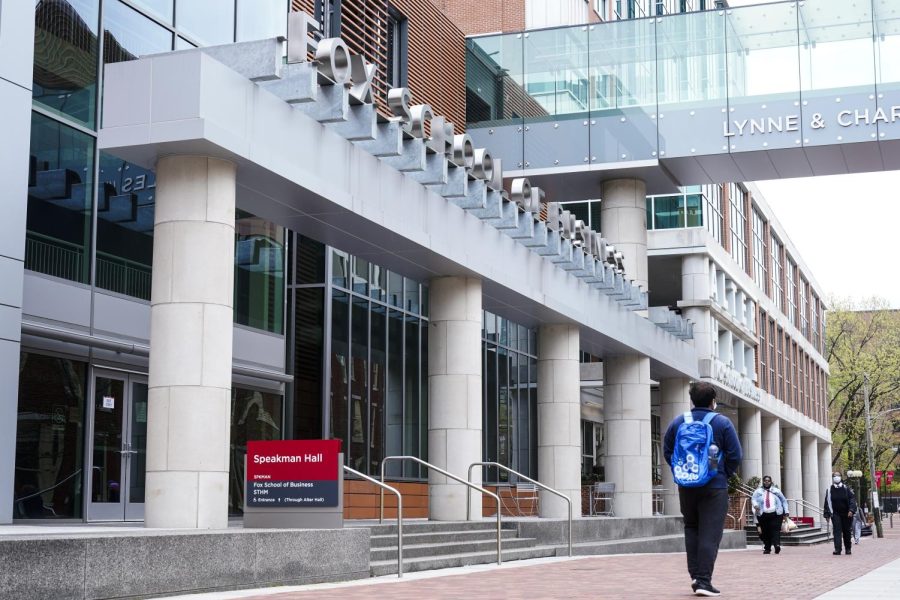Editorial | We stand with Temple’s striking graduate students
People walk past the Fox School of Business on the Temple University campus in Philadelphia, Friday, April 16, 2021.
February 13, 2023
At the end of January, graduate students at Temple University — a school with about 10,000 graduate students — took to the street to peacefully demand better benefits. Their efforts were met with increasing resistance from the university, which withheld tuition and health care benefits for about 100 graduate students on strike.
Temple told striking students that their tuition balances must be paid in full March 9, leaving them scrambling to come up with the necessary funds. Tuition remission, a benefit offered by many schools to help finance employed students’ tuition costs, covers an average of $20,000 at Temple. While this is a substantial amount of money, it fails to account for all of the living expenses and other debt graduate students are working to pay off, which is the exact reason students are demanding more pay.
Temple said Temple University Graduate Student Association members, about 750 students, have access to free healthcare and make about $25 an hour for a 20-hour work week — but that’s only about $19,500 a year for their primary source of income. To put things in perspective, Philadelphia’s average rent is $1,900, or $17,100 for the nine months students are employed by the university. All in all, once students pay their rent, they are most likely left with a severely restricted income to pay the rest of their bills, probable student loan payments and other living expenses.
As a result, TUGSA requested a 50% pay increase for its nine-month schedule, while Temple proposed an increase “in line with increases provided to non-bargaining full-time employees and negotiated with full-time bargaining units.” Boiled down, the university is taking advantage of the fact that the graduate student union works on a contractual basis. Therefore, when renegotiations are wanted or needed prior to the current contract’s end life — like now — the university can propose inequitable counteroffers.
U.S. News & World Report reported that after tuition freezes and discounts during the pandemic, undergraduate tuition rates are up this year at universities across the nation, as are graduate programs. They also reported that for the 2022-23 academic year, the average cost of tuition when attending a public college averages out to $10,423 for in-state tuition, while out-of-state tuition is estimated to cost $22,953 for the same year.
For graduate students, a master’s program averages out to $30,000, while a two-year program can cost approximately $50,000. For people with financial struggles — which is most Americans — that price tag is out of the question or poses a huge barrier when attempting to further your education.
Although most people associate unions with blue collar careers, unions are incredibly valuable organizations that advocate for the collective wellness of a working body. Think plumbers, power line workers, nurses, college faculty, staff — and students. They can all be in unions. Many graduate students work as teaching assistants in order to curb the debt they acquire during their education.
Ultimately, striking and unionizing workers need our support as more and more companies and institutions combat unionization efforts. In good news, Philadelphia’s city council passed a resolution last Thursday in support of TUGSA, which pressed Temple to meet TUGSA’s demands. While government protections are the ultimate way to protect workers — especially considering that Pennsylvania law outlines that workers who refuse to work are not entitled to compensation and work-related benefits — the public needs to show unwavering support for unions.



